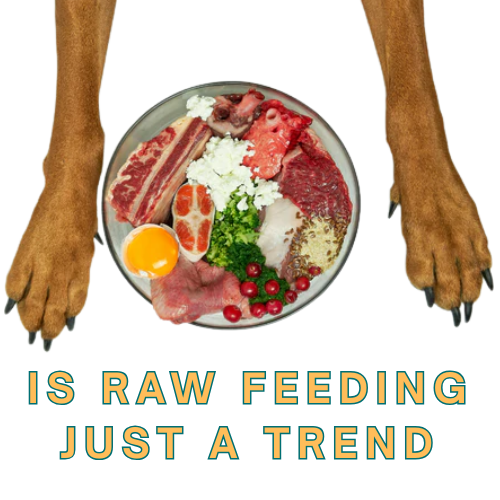🥩 Raw Feeding for Dogs: The Truth Behind the Trend
Is raw feeding really the best option for your dog?
In this week’s blog, we explore the pros and cons of raw diets, uncover the nutritional gaps many owners miss, and explain why adding the right natural supplements is essential for your dog’s long-term health.

🥩 Raw Feeding for Dogs: The Truth Behind the Trend
Over the past decade, raw feeding has become a growing trend in the world of canine nutrition. It’s marketed as the most “natural” way to feed our pets – mimicking the diet of their wild ancestors. One of the most popular raw approaches is the BARF diet – short for Biologically Appropriate Raw Food or Bones and Raw Food. It typically includes raw meat, bones, offal, and small portions of vegetables and fruit.
But as with anything that becomes a movement, it’s important to look at both sides of the bone.
At my Fur Baby, we believe in transparency and making informed choices when it comes to your dog’s health. So this week, we’re breaking down the pros and cons of raw feeding and why supplementation is often a missing (but essential) piece of the puzzle to ensure your dog gets everything they need from a natural diet.
✅ The Pros of Raw Feeding
-
Less Processed, More Natural
Raw feeding skips the heavy cooking and extrusion process found in many commercial kibbles, preserving more natural enzymes and nutrients. -
Improved Coat & Skin
Many raw-fed dogs develop shinier coats and healthier skin thanks to the inclusion of fresh meat, bones, and fats. -
Better Dental Health
Crunching through raw meaty bones can help reduce plaque and tartar – similar to how our natural chews work. -
Firmer Stools
Raw diets often lead to smaller, firmer stools with less odour – something most owners won’t complain about! -
Increased Energy & Lean Muscle
The high protein and natural fat content in raw diets can promote lean muscle mass and better energy levels.
❌ The Cons of Raw Feeding
-
Risk of Imbalance
Here’s the blunt truth: most DIY raw diets are nutritionally incomplete. Without proper formulation, dogs can become deficient in key vitamins, minerals, and fatty acids – especially calcium, zinc, vitamin D, and omega-3s. -
Bone Risks
Feeding whole bones (especially weight-bearing bones) can lead to tooth fractures or gastrointestinal injuries if not chosen carefully. -
Bacterial Contamination
Raw meat carries risks of Salmonella or E. coli – not just for dogs, but for people handling it. Hygiene is critical. -
Not Ideal for All Dogs
Puppies, seniors, or dogs with medical conditions often need more precise nutrition than raw can safely provide without expert guidance. -
Cost & Convenience
Let’s be honest – raw feeding is time-consuming, messy, and often more expensive than commercial diets, especially when done properly.
🧪 Why Supplementation Matters
Even the most committed raw feeders often don’t realise this:
Meat alone doesn’t equal a complete diet.
Dogs need a wide range of micronutrients that aren’t present in just muscle meat and bone. Without proper balancing, they may develop:
- Joint problems (lack of glucosamine/chondroitin)
- Dull coats or itchy skin (low omega-3s)
- Poor immunity (missing zinc, selenium, vitamin E)
- Bone issues (low calcium: phosphorus ratio)
That’s where natural pet supplements come in — including:
- Joint support (like our Beef Cartilage Moon Bones)
- Omega-3 oils or fish-based chew treats
- Multivitamin powders tailored for raw diets
If you're feeding raw (or considering it), make sure your dog is getting what they truly need — not just what looks good in the bowl.
🦴 Our Take at my Fur Baby
We’re not anti-raw — far from it. In fact, we’re big believers in species-appropriate nutrition. But it has to be done right. That means using trusted suppliers, rotating proteins, and supplementing wisely.
If you’re feeding raw, our range of natural, air-dried chews and cartilage treats can be a great addition — helping to support teeth, joints, and behaviour, while still aligning with your natural feeding philosophy.
Interested in adding supplements to your dog’s raw diet?
We're working on functional treat-based solutions — stay tuned, or drop us a message if you'd like to be the first to know when they’re live.
👉 Next Week: We’ll be diving deeper into natural whole food ways to add vital nutrients to your dog’s diet — using simple, real ingredients like eggshells, organs, and leafy greens. Don’t miss it!















